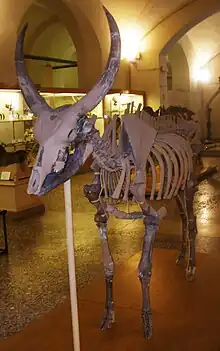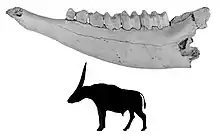Leptobos
Leptobos is an extinct genus of large bovine, known from the Late Pliocene and Early Pleistocene of Eurasia, extending from the Iberian Peninsula to northern China.[1] Species of Leptobos weighed on average 320 kilograms (710 lb).[2] The dietary preference across the genus includes species that were browsers,[3] grazers[4] and mixed feeders (both browsing and grazing).[5] The first appearance of Leptobos in Europe around 3.6-3.5 million years ago is considered to define the beginning of the Villafranchian European faunal stage.[6] Leptobos is considered to be closely related to the insular genus Epileptobos from the Pleistocene of Java[7], and is considered to be ancestral to Bison.[1] Leptobos became extinct after being replaced by their descendant Bison during the Early Pleistocene, after a period of temporal overlap.[1] "Leptobos" syrticus from Libya likely belongs in a different genus.[7]
| Leptobos Temporal range: Late Pliocene to Early Pleistocene | |
|---|---|
 | |
| Skeleton of Leptobos etruscus | |
| Scientific classification | |
| Domain: | Eukaryota |
| Kingdom: | Animalia |
| Phylum: | Chordata |
| Class: | Mammalia |
| Order: | Artiodactyla |
| Family: | Bovidae |
| Subfamily: | Bovinae |
| Genus: | †Leptobos Rütimeyer, 1878 |
| Species | |
|
See text | |
Species
- Leptobos brevicornis (China)
- Leptobos crassus (China)
- Leptobos falconeri (Pakistan)
- Leptobos stenometopon (France and Italy)
- Leptobos merlai (France and Italy)
- Leptobos furtivus (France also possibly Italy)
- Leptobos etruscus (France, Italy, and Spain)
- Leptobos vallisarni (Italy and China)

References
- Sorbelli, Leonardo; Alba, David M.; Cherin, Marco; Moullé, Pierre-Élie; Brugal, Jean-Philip; Madurell-Malapeira, Joan (June 2021). "A review on Bison schoetensacki and its closest relatives through the early-Middle Pleistocene transition: Insights from the Vallparadís Section (NE Iberian Peninsula) and other European localities". Quaternary Science Reviews. 261: 106933. doi:10.1016/j.quascirev.2021.106933. S2CID 235527116.
- Brugal, Jean‑Philip; Croitor, Roman (2007-06-01). "Evolution, ecology and biochronology of herbivore associations in Europe during the last 3 million years". Quaternaire. 18 (2): 129152. doi:10.4000/quaternaire.1014. ISSN 1142-2904.
- Haiduc, Bogdan S.; Răţoi, Bogdan G.; Semprebon, Gina M. (2018-02-22). "Dietary reconstruction of Plio-Pleistocene proboscideans from the Carpathian Basin of Romania using enamel microwear". Quaternary International. 467: 222–229. doi:10.1016/j.quaint.2018.01.039. ISSN 1040-6182.
- Zhao, LingXia; Zhang, LiZhao; Zhang, FuSong; Wu, XinZhi (2011-09-12). "Enamel carbon isotope evidence of diet and habitat of Gigantopithecus blacki and associated mammalian megafauna in the Early Pleistocene of South China". Chinese Science Bulletin. 56 (33): 3590–3595. doi:10.1007/s11434-011-4732-4. ISSN 1001-6538. S2CID 129987242.
- Strani, Flavia; DeMiguel, Daniel; Sardella, Raffaele; Bellucci, Luca (July 2018). "Resource and niche differentiation mechanisms by sympatric Early Pleistocene ungulates: the case study of Coste San Giacomo". Quaternary International. 481: 157–163. doi:10.1016/j.quaint.2017.08.064. S2CID 90466225.
- van Kolfschoten, T. (2013-01-01), "QUATERNARY STRATIGRAPHY | Continental Biostratigraphy", in Elias, Scott A.; Mock, Cary J. (eds.), Encyclopedia of Quaternary Science (Second Edition), Amsterdam: Elsevier, pp. 206–214, ISBN 978-0-444-53642-6, retrieved 2021-10-31
- Mead, Jim I.; Jin, Changzhu; Wei, Guangbiao; Sun, Chengkai; Wang, Yuan; Swift, Sandra L.; Zheng, Longting (December 2014). "New data on Leptobos crassus (Artiodactyla, Bovidae) from Renzidong Cave, Early Pleistocene (Nihewanian) of Anhui, China, and an overview of the genus". Quaternary International. 354: 139–146. doi:10.1016/j.quaint.2014.02.019.
External links
- http://www.helsinki.fi/~mhaaramo/metazoa/deuterostoma/chordata/synapsida/eutheria/artiodactyla/bovioidea/boselaphini.html
- http://paleodb.org/cgi-bin/bridge.pl